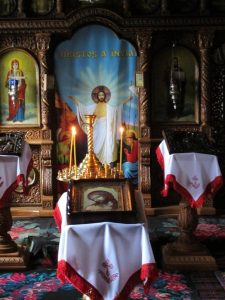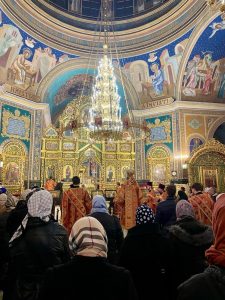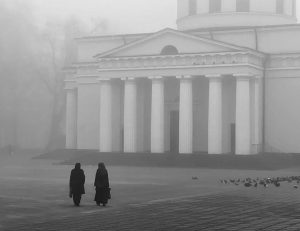A letter drafted by the Metropolitan of Moldova and leaked to the press in October 2023 was a bombshell in a country better known for its fugitive oligarchs than its rebellious popes. In five pages, the head of the Moldovan Orthodox Church accuses the Moscow Patriarchate of having “pushed to the periphery of society” the Moldovan Church, which has been attached to the Russian Patriarchate since 1940. Far from being a simple war of chapels, this episode illustrates the tensions in Moldovan society, gradually shedding Russian influence to turn towards Europe.
 In Moldova, where 90% of the population is Orthodox, the festive season was approached with a certain serenity. At the cost of considerable effort, the country was prepared for winter this time, as Chisinau cut off its direct links with Gazprom. Therefore, Russia has lost an essential lever of influence in a country it considers part of its “near abroad.” Strengthening Moldova’s energy security comes at just the right time, as the country was hit by a violent storm from the Black Sea at the end of November. With a snow-covered landscape but guaranteed heating and with the prospect, announced on 14 December, of the opening of negotiations, the situation looked pretty good going into 2024. However, resistance is being organized behind the heavy doors and the fumes of incense in the churches that filled up with the faithful on 7 January to celebrate Christmas according to the Gregorian calendar(1).
In Moldova, where 90% of the population is Orthodox, the festive season was approached with a certain serenity. At the cost of considerable effort, the country was prepared for winter this time, as Chisinau cut off its direct links with Gazprom. Therefore, Russia has lost an essential lever of influence in a country it considers part of its “near abroad.” Strengthening Moldova’s energy security comes at just the right time, as the country was hit by a violent storm from the Black Sea at the end of November. With a snow-covered landscape but guaranteed heating and with the prospect, announced on 14 December, of the opening of negotiations, the situation looked pretty good going into 2024. However, resistance is being organized behind the heavy doors and the fumes of incense in the churches that filled up with the faithful on 7 January to celebrate Christmas according to the Gregorian calendar(1).
Parochial quarrel between Moscow and Chisinau
It all began with a letter. Not a letter addressed to Moș Crăciun or Ded Moroz(2), but a letter to Cyril, Patriarch of Moscow, written in September by Metropolitan Vladimir, Primate of the Orthodox Church of Moldova. The letter was made public on 20 October by Vlad Cubreacov, a member of parliament from the far-right AUR party. In his somewhat desperate letter, Vladimir accuses Russia of abandoning the Church of Moldova. He explains that because it belongs to the Moscow Patriarchate, Moldovan society perceives its Church as “an outpost of the Kremlin and a supporter of Russian intervention in Ukraine.” According to Vladimir, “This connection is tantamount to our disappearance from the country’s religious and social scene, by a firm rejection by our fellow citizens of Russia’s aggressive interference in the affairs of Ukraine, a neighboring and friendly country, but also in our affairs.”
Indeed, Moldova has been on the front line in welcoming Ukrainian refugees following the Russian invasion: almost 1 million have crossed the border separating the two countries since 24 February 2022(3), a colossal figure - even if not all of them have stayed - compared with the 2.5 million Moldovans. The rejection of Russian aggression is accompanied by a growing European aspiration: at the end of 2022, 63% of the population said they supported the country’s application to join the EU(4), submitted by the pro-European President Maia Sandu a few weeks after the invasion. Not to mention the numerous attempts at destabilization of which Chisinau accuses the Kremlin: financing of opposition parties, recurrent false bomb threats, gas blackmail, and, of course, support for the separatist region of Transnistria. Against this backdrop, the Moldovan Church’s attachment to the Moscow Patriarchate, an imperial legacy, is increasingly criticized. All the more so, Patriarch Cyril is subordinate to the will of the Kremlin and openly supports the war in Ukraine, going so far as to bless the soldiers and weapons going to the front.

© Alexandre Lorot
Moldova’s disgrace at the All-Russian Patriarchate
At independence in 1991, Moldova found itself with two Orthodox Churches, each claiming authority over the territory of the former Soviet Socialist Republic(5): on the one hand, the Metropolis of Chisinau and the whole of Moldova attached to the Patriarchate of Moscow and the whole of Russia, and on the other, the Metropolis of Bessarabia attached to the Patriarchate of the whole of Romania. The claims of these two Churches are based on the tumultuous past of Moldavia, which was, in turn, a Romanian principality, then a province of the Russian Empire under the name of Bessarabia following its annexation in 1812 before becoming part of the Soviet Union in 1940 after having briefly declared its independence and then its attachment to Romania in 1918. In 2002, the European Court of Human Rights established the legitimacy of the two Metropolises. The Metropolis of Moldova is the most robust, accounting for almost 90% of the Orthodox population. Since the ECHR ruling 2002, the debate had not found a natural echo in Moldovan public consciousness until the autumn of 2023.
The Metropolitan’s letter reflects the crisis facing the Moldovan Orthodox Church. Before 2022, almost 70% of Moldovans surveyed cited the Church as a trusted institution. This threshold fell to 62.5% in 2022, then to 58% in 2023. In addition to the growing rejection of Russian influence, this drop in confidence can be explained by several factors. Firstly, the role of the Church during the pandemic, a period during which it distinguished itself by its disinformation campaign against vaccines. Nor did the Church shine in welcoming refugees at a time when other denominations gave sometimes very active support to the Ukrainians. On the contrary, the priests of the Orthodox Church of Moldavia supported, in a more or less assumed way, the Russian aggression in Ukraine. Archbishop Marcel de Balti, who is notoriously pro-Russian, defied Moldovan law by wearing a St George’s ribbon on Victory Day, 9 May 2022.
But it would appear that the Metropolitan is no longer satisfied with his position as a relay of Russian influence in Moldova. The Primate points to Moscow’s “disrespectful” attitude towards Chisinau. In his bitter letter, Vladimir refers to his efforts to draw Cyril’s attention to the difficulties encountered by his flock. In particular, the Metropolitan is said to have asked for funds to compensate for the increase in heating prices, a direct consequence of Russia’s war in Ukraine. The clergyman also criticized Russia for its paternalism towards Moldova, accusing it of treating Moldovans “like a peripheral and spineless people, deprived of the right to make the decisions they consider necessary for their well-being and prosperity.”

© Alexandre Lorot
A boon for the Metropolis of Bessarabia
In his letter, the Metropolitan also mentions the growing influence of the Romanian Patriarchate. According to him, the Romanian Orthodox Church is becoming more attractive, offering salaries twice as high as the average wage and a social security and pension scheme. The letter’s publication accelerated the reorganization of the religious landscape in Moldavia. It led to a significant movement within Moldavian parishes, raising the specter of a “raskol”, the term used to describe the schism of the Russian Orthodox Church in the 17th century. Since then, 14 of them have come under the authority of the Metropolitan of Bessarabia, the latest being the church of Saint-Nicolas in Chisinau on 3 December. Eleven priests have been defrocked for their change of allegiance, and the Metropolis of Bessarabia has announced its intention to recover the cathedral of Saint Constantine and Helena in Balti, much to the displeasure of Archbishop Marcel.
Vladimir’s sermon has been emulated by priests from eight churches in Chisinau, who took their pen on 11 November to call for the Metropolis of Bessarabia to join them. Two days later, Chisinau-based priest Pavel Borschevsky wrote an open letter calling Metropolitan Vladimir to organize the departure of the Moldovan Orthodox Church and its union with the Romanian Patriarchate. Faced with the extent of the reaction, Metropolitan Vladimir convened a synod of popes on 16 November, from which little came out other than that the Orthodox Church of Moldavia remained united and that joining the Romanian Patriarchate was not envisaged.

© Alexandre Lorot.
Russia’s influence continues to wane in Moldova.
This repudiation of the Moscow Patriarchate within an institution traditionally presented as an instrument of Russian influence is striking. Russia’s contempt for Moldova, reflected in the Patriarchate’s attitude, is causing even its most loyal supporters to react. After the energy sector, it seems that the realm of the spirit and faith is seeking to free itself from the former tutelary power. The reaction of the parishes is proof of the change of direction in Moldovan society, in a country where the Church plays a role in the formation of identity, particularly in rural areas.
Joining the Romanian Church would, however, raise several delicate issues, notably the appointment of a single Moldovan Metropolitan. There is another option: autocephaly. This was the decision taken in Kyiv in 2018 in response to Russian aggression in Crimea and the Donbas. However, the small size of the Moldovan Orthodox Church and the strength of its links with Romania make this choice unlikely. Metropolitan Vladimir’s letter called for a radical change. Still, in the absence of a decision on his part and a response from Moscow, the most likely scenario remains that of a multiplication of initiatives by priests and dioceses along the lines of those who have already joined the Metropolis of Bessarabia. Unless a response from the Moscow Patriarchate reassures the faithful. Vladimir did travel to Moscow on 27 December for the meeting of the Holy Synod of the Russian Orthodox Church. Still, it is unknown whether the tensions within the Moldovan Church were discussed on that occasion. In any case, it seems unlikely that Cyril will respond publicly.
Notes:
(1) The Metropolis of Bessarabia (Romanian obedience) celebrates Christmas on 25 December, while the Metropolis of Moldavia (Russian obedience) celebrates it on 7 January. Many Moldovans celebrate Christmas twice. This year, President Maia Sandu presented her Christmas greetings on 24 December, but the country did not follow Ukraine in “officially” changing the date Christmas is celebrated.
(2) Romanian and Slavic equivalents of Santa Claus.
(3) Figures from the Office of the United Nations High Commissioner for Refugees (consulted on 29 December 2023). At the beginning of December 2023, the UNHCR estimated that there were almost 113,000 Ukrainians registered in Moldova.
(4) Survey conducted by the International Republican Institute in December 2022.
(5) It should be noted that such an organization of the Orthodox Church is not unique. It is similar, for example, to the situation in Estonia.
Thumbnail and photo: Nativity Cathedral in Chisinau, the seat of the Russian Orthodox Church of Moldavia (© Alexandre Lorot).
* Apolline Carras is studying for a Master 2 in International Relations and Russian at Inalco.
Link to the French version of the article
Translated from French by Assen SLIM (Blog)
To quote this article: Apolline CARRAS (2024), “Towards a Moldovan “raskol”?” Regard sur l’Est, January 15.
